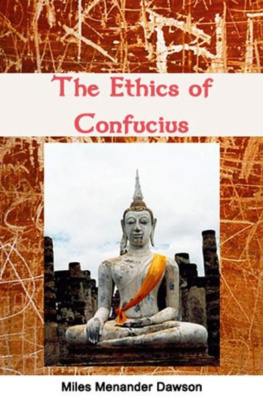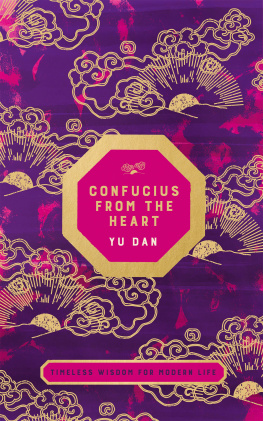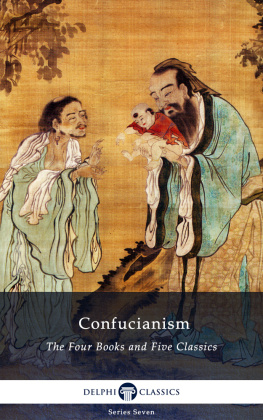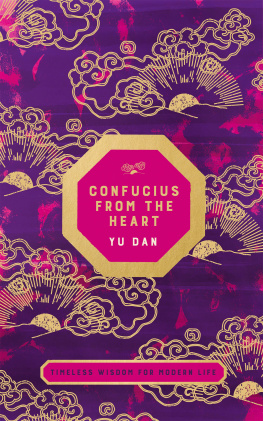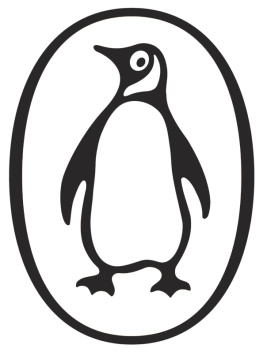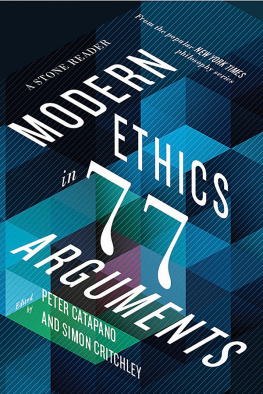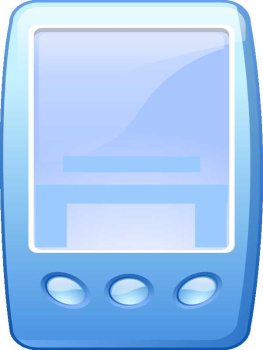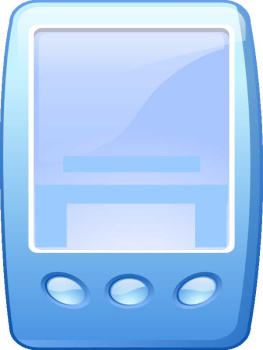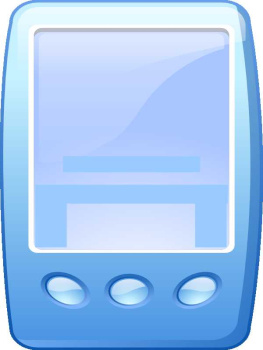Miles Menander Dawson (Editor) - The Ethics of Confucius
Here you can read online Miles Menander Dawson (Editor) - The Ethics of Confucius full text of the book (entire story) in english for free. Download pdf and epub, get meaning, cover and reviews about this ebook. year: 2002, publisher: University Press of the Pacific, genre: Science. Description of the work, (preface) as well as reviews are available. Best literature library LitArk.com created for fans of good reading and offers a wide selection of genres:
Romance novel
Science fiction
Adventure
Detective
Science
History
Home and family
Prose
Art
Politics
Computer
Non-fiction
Religion
Business
Children
Humor
Choose a favorite category and find really read worthwhile books. Enjoy immersion in the world of imagination, feel the emotions of the characters or learn something new for yourself, make an fascinating discovery.
- Book:The Ethics of Confucius
- Author:
- Publisher:University Press of the Pacific
- Genre:
- Year:2002
- Rating:5 / 5
- Favourites:Add to favourites
- Your mark:
- 100
- 1
- 2
- 3
- 4
- 5
The Ethics of Confucius: summary, description and annotation
We offer to read an annotation, description, summary or preface (depends on what the author of the book "The Ethics of Confucius" wrote himself). If you haven't found the necessary information about the book — write in the comments, we will try to find it.
The Ethics of Confucius — read online for free the complete book (whole text) full work
Below is the text of the book, divided by pages. System saving the place of the last page read, allows you to conveniently read the book "The Ethics of Confucius" online for free, without having to search again every time where you left off. Put a bookmark, and you can go to the page where you finished reading at any time.
Font size:
Interval:
Bookmark:
Confucius, The Ethics of Confucius [1915]
Edition used:
The Ethics of Confucius. The Sayings of the Master and his Disciples upon the Conduct of The Superior Man, arranged according to the plan of Confucius with running commentary by Miles Menander Dawson, with a foreword by Wu Ting Fang (New York: G.P. Putnams Sons, 1915).
- Author: Confucius
- Editor: Miles Menander Dawson
- Foreword: Wu Ting Fang
About this title:
A collection of Confucius ethical writings on topics such as the superior man, self-development, human relations, the family, the state, the cultivation of the fine arts, and religion.
Copyright information:
The text is in the public domain.
Fair use statement:
This material is put online to further the educational goals of Liberty Fund, Inc. Unless otherwise stated in the Copyright Information section above, this material may be used freely for educational and academic purposes. It may not be used in any way for profit.

CONFUCIUS
From a drawing by Kiechu Yamada, Based upon an Ancient Copy of the Traditional Portrait
Reproduced by the courtesy of Dr. Paul Carus
To
MISS JESSIE B. RITTENHOUSE,
DISCRIMINATING CRITIC AND UNFAILING FRIEND,
TO WHOSE APPRECIATION
THE AUTHORS PERSEVERANCE IN THE ARDUOUS LABOR
OF COLLECTING AND COLLATING THE TEXT FOR THIS BOOK
AND PREPARING IT FOR ITS READERS IS CHIEFLY DUE,
T HIS V OLUME I S G RATEFULLY I NSCRIBED.
FOREWORD
W HEN Confucius died, it is recorded that his last words were regrets that none among the rulers then living possessed the sagacity requisite to a proper appreciation of his ethical philosophy and teachings. He died unhonoured,died in his seventy-third year, 479 BC , feeling in the flickering beats of his failing heart that his inspiring pleas for truth and justice, industry and self-denial, moderation and public duty, though then without having awakened mens impulses, would yet stir the depths of the social life of his land.
Only the future will tell how far his staunch guide-ropes to correct conduct will be extended within China, and even be threaded through the dark and dangerous passages of existence in the lands of the Occident to lead humanity safely to that elevated plane which the lofty ideals of the philosopher aimed at establishing. Not yet has the world, sagacious as it is, appreciated the wealth of gentleness, the profound forces for good, the uplifting influences embodied in the teachings of the ancient sage, whose aim, reduced to its simplest definition, was to show how to get through life like a courteous gentleman.
A great step forward in the dissemination of the doctrine in foreign lands is taken in The Superior Man. Lofty as appear the ideals, in the usual translations, they lose the effect on the average reader that the application which Mr. Dawson has now given them must create. Driving home the principles by careful compilation under different headings, the author causes the scheme of ethical conduct to attract and appeal; and the blessings it has bestowed in the vast expanses of China may yet give comfort to many people in many other lands.
Confucius strove to make the human being gooda good father, a good mother, a good son, a good daughter, a good friend, a good citizen. Though his truths were unpalatable at the time of their enunciation, they have lived to bear good fruit, despite the desperate efforts of Emperor Tsin Shi-hwang to destroy them by fire, and it is gratifying to see that a still wider sphere is being more and more developed for them in the West.
The movement that is now being energized in China to make the doctrine more familiar to the people, may also find reflection in foreign lands. The Superior Man will surely help the struggler in the mire of complexity to find his way out to the clean, substantial foothold of manliness and integrity.
SHANGHAI, CHINA,January 29, 1912.
INTRODUCTION
WORKS OF CONFUCIUS AND CHIEF FOLLOWERS
T HE ethical and political precepts of Confucius are not well known in Occidental countries, even to most of those who give special attention to these subjects; and of what is known, much, indeed most, is confused with the notion that Confucius taught a religion in our sense of that term.
Yet these ethical teachings, which are almost purely secular, have for more than 2000 years been accepted by a larger number of human beings than those of any other teacher. This, also, notwithstanding that the peoples who so receive Confucian morals as their guide are of the most various views concerning religion, i. e., for instance, are Buddhists, Mahometans, Taoists, Shintoists, etc. No other ethical system, whether of religious origin, or of secular, has ever been acceptable to persons professing religious convictions so diverse.
And his political maxims have been regarded as fundamental, and knowledge of them, as well as of his ethics, has been insisted upon as a prime essential to political preferment, in a nation which, despite the not infrequent shifting of ruling dynasties, has the unparalleled record of continuing from prehistoric times to the present without a single break.
In view of their obvious importance and of the availability of translations of the Chinese classics, the question naturally arises: Why the prevailing want of information concerning the works of Confucius, his disciples and followers?
Though due in part, no doubt, to Confucianism not being a religion and so receiving but scant attention from students of comparative religions, to the relatively small interest of Occidentals, until very recently, in things Chinese, and to the comewhat expensive editions in which alone the best translation is available, the want of information concerning these teachings is, in my opinion, chiefly due to this: They are found in large volumes consisting of ancient Chinese classics which Confucius edited, of a collection of his sayings, of certain books by his disciples that purport to give his precepts accurately, in one book by his great apostle, Mencius, who more than a century later led the revival of Confucian ethics which has continued to this day, and in certain books by later followers; and these books consist, in varying proportions, ranging from a minimum of more than half to a maximum of at least nineteen-twentieths, of discourses upon ceremonies, customs, and the like, possibly of great interest to dwellers in China or Japan, but almost absolutely devoid of interest to most Occidentals.
These ceremonies and customs, already firmly intrenched when Confucius was born, doubtless constitute a very rich and expressive language, crystallized into conduct; but it is one which is wholly unintelligible and even repellent to persons of Western origin.
The only form, other than this, in which the ethical teachings of Confucius and his followers have been presented, is through books about these teachings, i. e., presenting, in the language of these modern authors, what they consider Confucius and his followers have taught.
The aim in preparing this book is to put before Occidental readers, in the words of the Chinese sage and his followers, as translated, everything concerning ethics and statecraft contained in the Confucian classics which is likely to interest them, omitting nothing of importance. This has been undertaken in the following fashion:
Every such passage has been extracted from all the works comprising the Confucian classics and several from the more important works of early Confucian scholars.
These have been arranged by topics in accordance with a scheme laid down as that of Confucius himself in The Great Learning.
Next pageFont size:
Interval:
Bookmark:
Similar books «The Ethics of Confucius»
Look at similar books to The Ethics of Confucius. We have selected literature similar in name and meaning in the hope of providing readers with more options to find new, interesting, not yet read works.
Discussion, reviews of the book The Ethics of Confucius and just readers' own opinions. Leave your comments, write what you think about the work, its meaning or the main characters. Specify what exactly you liked and what you didn't like, and why you think so.

